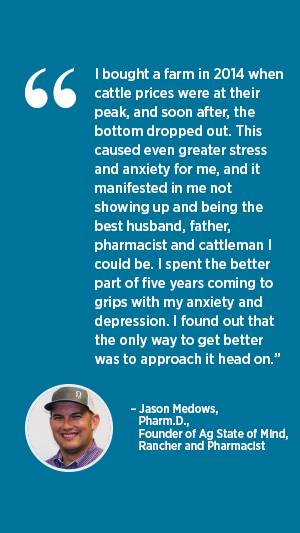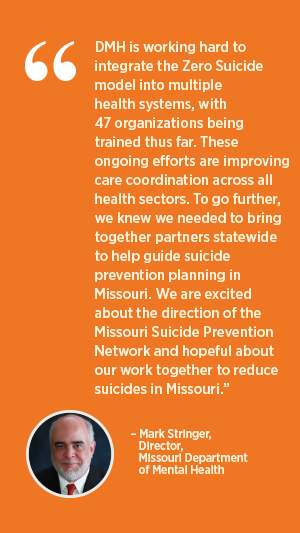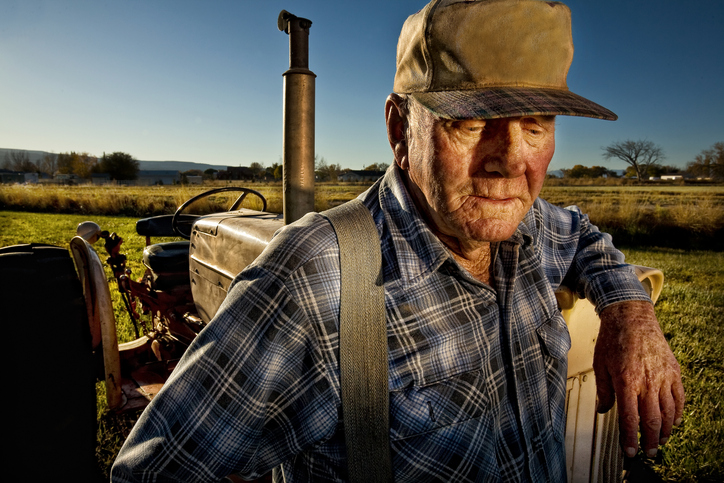Expert

Dave Dillon
Actions
Type
Topic
- Behavioral Health
- Rural Health
Tags
According to a new report, mental health challenges and suicide are a growing public health concern for Missouri farmers and ranchers. A confluence of numerous factors — from market and credit instability, social identity and tradition, to rural geography and the rural health care system — compound the stress and insecurity of production agriculture while limiting access to care for behavioral health.
In Missouri, rural residents have significantly higher rates of depression, experience increased difficulty in receiving mental health care and have higher rates of deaths from suicide. Experts suggest other stressors unique to the agricultural community create rural mental health disparities that are even more profound for farmers.
Contributing Organizations:
- Missouri Hospital Association
- Missouri Department of Mental Health
- Missouri Coalition for Community Behavioral Healthcare
- Missouri Farm Bureau and the University of Missouri Extension
 “The rural behavioral health crisis is exacerbated by the agricultural crisis in Missouri,” said Mat Reidhead, Missouri Hospital Association Vice President of Research and Analytics and a primary author of the report. “The behavioral health care system has too few assets in rural Missouri to address the scope of the challenges. At the same time, the intimacy of small rural communities, perception of farmers as strong and independent, and the perceived stigma of mental illness, all combine to discourage individuals in crisis from seeking care.”
“The rural behavioral health crisis is exacerbated by the agricultural crisis in Missouri,” said Mat Reidhead, Missouri Hospital Association Vice President of Research and Analytics and a primary author of the report. “The behavioral health care system has too few assets in rural Missouri to address the scope of the challenges. At the same time, the intimacy of small rural communities, perception of farmers as strong and independent, and the perceived stigma of mental illness, all combine to discourage individuals in crisis from seeking care.”
Missouri’s farmers and ranchers have faced numerous economic challenges.
- While the U.S. economy has largely experienced quarter-over-quarter growth since the end of the recession in 2008-2009, the farm sector has experienced six periods of recession.
- Missouri has nearly 16,000 fewer family farms today compared to 20 years ago, and bankruptcies are on the rise. Bushel prices have fallen by 47% since 2012, while farm income and credit conditions have deteriorated.
Complicating matters, too few behavioral health resources are available in rural Missouri.Where these resources can be found, the stigma of mental health treatment can discourage care.
“Unfortunately, barriers to access due to stigma are common in rural Missouri,” said Brent McGinty, President and CEO, Missouri Coalition for Community Behavioral Healthcare. “Farmers are less likely to seek out mental health care even if they do live near a behavioral health clinic. Everyone in town knows what your truck looks like, and they put two and two together when it’s parked out front.”
The cultural biases associated with behavioral health care are matched in scope by a behavioral health care system in the state that is insufficient to provide the type of care needed in the best possible environment.

- Each of Missouri’s 99 rural counties is a designated Mental Health Professional Shortage Area. With just 3.7% of the recommended resources available, Missouri faces the largest shortage of behavioral health care providers in the U.S.
- Suicide is growing at an alarming rate in rural Missouri. Between 2003 and 2017, the suicide rate among rural Missourians grew by 78%, and throughout the last decade, their hospital emergency department visits for suicide attempt or ideation increased 177%. Rural men between the ages of 35 and 44 have triple the statewide suicide mortality rate.
Very few tools are available to address the macroeconomic influences on rural Missourians and the state’s farmers and ranchers. However, numerous organizations are working to extend the mental health services that can deliver better care and better health, locally to rural communities.
“No single solution will address the gaps in access to behavioral health services,” Reidhead said. “However, through technology, additional investment in the behavioral health workforce, stigma reduction, and better connections between caregivers and health plans, individuals in crisis or in need of long-term support can find the help they need.”
The new research was released to elevate awareness of disparities in economic factors for farmers and mental health outcomes for rural Missourians. The report presents policy opportunities designed to expand access to mental health services, reduce stigma and improve mental health outcomes for rural Missourians.









